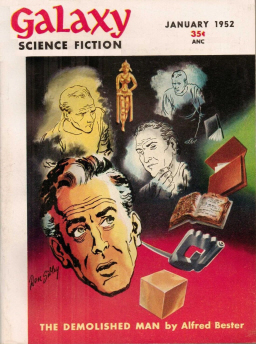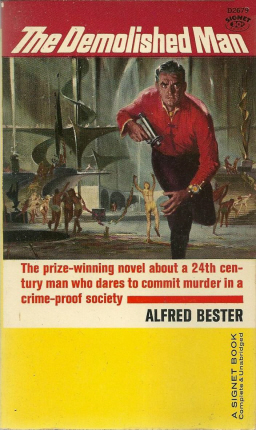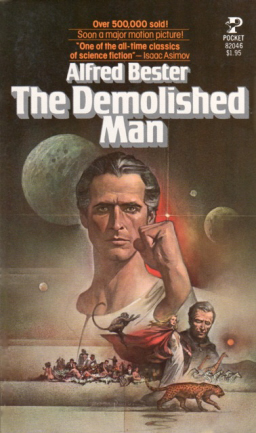Galaxy Science Fiction, January 1952: A Retro-Review
 Sometimes, it’s easy to think that writing science fiction in the early 1950’s couldn’t be easier. After all, how many cliches existed at that time?
Sometimes, it’s easy to think that writing science fiction in the early 1950’s couldn’t be easier. After all, how many cliches existed at that time?
Well, apparently there were plenty. Gold writes in his opening of Galaxy’s January, 1952 issue:
The world today is loaded with ifs! So crammed, crowded, bulging with ifs jostling each other, in fact, that it’s a pure bafflement to see writers turning the same ones over and over, looking for some new bump never before noticed on the use-worn surfaces.
Yes, he wrote this for the January 1952 issue. The more of his commentaries I read, the more I think nothing has really changed over time.
Galaxy set the bar high, not allowing anyone to write stale stories. “Known authors who depend on their names to sell inferior fiction are finding no market in Galaxy; new authors who are willing to dig for ideas and fresh treatments are getting an enthusiastic, cooperative welcome.” Gold cared deeply about quality fiction and it’s clear to me with each issue I read that he accomplished it.
I’d love the chance to tell him how much I respect the work he did back then, but since I can’t, I only hope it serves to drive others toward that same level of quality, whether as editors, authors, artists, or any other roles involved with speculative fiction. Let’s look to Galaxy as a standard to match or exceed, if that’s even possible.
The Demolished Man (Part 1) by Alfred Bester — Espers, with their ability to read thoughts at varying levels of consciousness, serve society in many ways. They provide safety since no one can commit violent crimes without projecting those dark intentions. Also, they allow vendors to accurately target customers; in fact, ad campaigns can be tested on audiences without the need for surveys (since the espers can sense the audience’s reaction).
 Ben Reich is one of the most powerful men on Earth, but he isn’t an esper. He has a recurring nightmare of a man with no face, and he concludes that the faceless man represents his business rival, Craye D’Courtney. To silence the nightmares, Reich believes he must murder the D’Courtney. And the only way to do so without detection is to corrupt one of the highest ranking espers to cover his tracks.
Ben Reich is one of the most powerful men on Earth, but he isn’t an esper. He has a recurring nightmare of a man with no face, and he concludes that the faceless man represents his business rival, Craye D’Courtney. To silence the nightmares, Reich believes he must murder the D’Courtney. And the only way to do so without detection is to corrupt one of the highest ranking espers to cover his tracks.
The Demolished Man won the very first Hugo Award for Best Novel in 1953 and it was the only Hugo Bester won (though he was nominated several times). Gold influenced the novel to some degree and Bester dedicated the novel to him. Part 1 opens in a unique way by introducing a series of characters and incidents that lead up to Reich’s introduction.
The interplay between Reich and the espers is intriguing, and I enjoyed the way that Bester visually wrote how the espers think (you have to see it in the pages to understand what I mean). I have a suspicion on where the plot might be heading, but I will reserve my speculations for now. Overall, this first part moves with good pacing and I’m ready for the next.
“Dead End” by Wallace Macfarlane — Humanity has eternal life, at least to some degree. Pseudo-life allows a person to live on after his or her body dies. By routinely visiting a psych lab to record thoughts in a mind machine, a person can be restored to that moment in a new body. The side effects, however, are that the person cannot have new thoughts, experience feelings, or reproduce.
I won’t get into the details of the story beyond that so as not to reveal anything. This is a great story with thoughtful commentary on immortality.
“The Girls From Earth” by Frank M. Robinson — On distant colony planets, men greatly outnumber the women. These are the pioneers, the daring explorers, yet few women dared to be as bold, leaving an unbalanced society, gender-wise, on Earth and on outer colonies. It’s a problem to be solved by Claude Escher; the Colonization Board has given him as many resources as needed to produce a solution. Escher rationalizes that it’s not hard to solve, “provided you held your nose, silenced your conscience, and were willing to forget that there was such a thing as a moral code.”
When I flipped to this story in my magazine, I saw some scribbles at the top, but that isn’t uncommon with older magazines. Then I looked closer. It was Frank M. Robinson’s autograph dated March 25, 1978!
 I soon looked through some other unread Galaxy issues I’ve acquired, but I haven’t found any other autographs so far. Still, this was really a great find. The story itself isn’t one of Robinson’s best stories, and it applies several stereotypes. But overall, it’s a fun read with a warm ending.
I soon looked through some other unread Galaxy issues I’ve acquired, but I haven’t found any other autographs so far. Still, this was really a great find. The story itself isn’t one of Robinson’s best stories, and it applies several stereotypes. But overall, it’s a fun read with a warm ending.
“The Furious Rose” by Dean Evans – Tony Radek is the Federal Executioner, and it is a mundane job. Central Direction orders an execution on an imprisoned man for “mass interference of morale.” The condemned man’s wife comes to visit Radek, pleading for his life and claiming his innocence. Radek considers her request, even as he leaves her to meet her husband for the first and last time.
This is a good story, but it’s a different kind of good story. I think this tale captures the futility of a fallen system, how powerless one person is. There’s an uncomfortable reality behind it, a dreariness that leaves the reader with a sigh of regret.
“The Addicts” by William Morrison — Palmer and his wife Louise live on an asteroid, staffing what is essentially a lighthouse for starships. To deal with the isolation, Palmer became a marak addict; the drug leaves him in a continual state where everything seems wonderful. Though the drug supposedly doesn’t interfere with thinking, Louise is convinced that his state of mind is preventing him from dealing with their impending death.
A group of alien monsters has come to their asteroid, waiting for the two to leave the protection of their home, which they must do when the lighthouse fails. And when they do, only one of them will care about being devoured; the other will consider the experience wonderful.
I like how the author created Palmer; he was perfectly apathetic in a cheerful way. I’m still not sure if I liked the ending or not, but either way, it’s still a good read.
“Hallucination Orbit” by J. T. M’Intosh — Ord lives in complete isolation, manning a space station on Pluto. It wasn’t supposed to be a six-year mission, but one of the beams that guides spacheships to the outer reaches of the solar system failed. Now he waits for relief, not only from his duty, but from the solitosis — a condition developed by those isolated for long spans of time, resulting in hallucinations.
For Ord, it’s usually women; they appear as stranded spacefarers or criminals escaping prosecution. They stay with him and interact like real women, but he knows they’re not. Except that now he’s not so sure. Maybe someone is real. Or maybe nothing’s real, including the space station.
J.T. M’Intosh (and McIntosh) were pseudonyms of James Murdoch MacGregor. This story was his first in Galaxy, but he had many short stories published in the magazine over the years.
This was my favorite story in the issue. I liked trying to figure out what was real or illusion, nodding in agreement with the protagonist as he tried various tests with each new character to identify them as true or false. Well done.
Matthew Wuertz’s last retro review for us was the December 1951 issue of Galaxy Science Fiction.
This was an excellent issue. I have never read “The Demolished Man,” so I was ready to dive in.
Mr. Gold’s editorial brings up a few questions. If the same things that are cliches now (war, doom and gloom in general) were cliches in 1952, when were they new ideas? Were they cliches in 1920? Earlier? It must have started somewhere…? Also, since science fiction does tend to dwell on distopias and fear in general, what will future authors use as cliches? The hot buttons are now climate change and terrorism. In 2060, what will our great fears be? Now I am speculating about the speculators. Let’s get to the stories.
“The Demolished Man” explores how people with esp might integrate into business and society. Reich’s plan to murder D’Courtney is clever and complicated because any esper can see his plan in his mind. He gets a song stuck in his head to avoid detection (a current setting might use “Let it Go” from Frozen. MAN I am sick of that song). The final scene and the cliffhanger set up nicely. I am curious why D’Courtney insisted that he was not Reich’s enemy. Reich did not give him a chance to answer, but I am sure we will find out.
The typesetter must have hated the mind-reading conversations, all jumbled across the pages.
Another traditional male fantasy (immortality) comes under fire in “Dead End.” I will also try not to reveal much, but, honestly, I had a hard time buying into this one. Some of the societal taboos, like sharing a meal with the opposite gender, seemed a little random to me. There is some nice speculation about immortality, and it is not all set up like yet another cautionary fable. This might be worth a re-read, and I did enjoy it, but it was not my favorite.
The best story for de-bunking of male fantasies is Alfred Bester’s “5,271,009.” Hilarious!
My copy isn’t autographed 🙁
“The Girls From Earth” is cute and predictable, but that only makes it more fun. The sense of dread builds to the inevitable conclusion, and I am glad Mr. Robinson handled the ending the way he did. This could have been a way of making fun of societal outcasts, but instead it ends with smiles for everyone. This is not a classic but it is worth reading.
“The Furious Rose” is dangerously close to the cliches that Mr. Gold wanted to avoid. A powerful government in a distopian (somewhat) society seeks to execute a man for “mass interference of morale.” Essentially, this played on our fear of Soviet society, in my humble opinion. None of the potential cliches matter, though, because this is so well written, and it focuses on the human side of the issues involved, especially the story of the poor widow-to-be, who will have to remarry immediately after the execution. Dark, scary, and emotional stuff. Excellent.
I love the old fashioned stories set in space and spaceships, which is probably the ultimate science fiction cliche. These last two stories were a real treat for me.
I don’t really know how much of a drug culture existed in 1952. I wasn’t there. So, “The Addicts” might be considered visionary, considering the popularization of drugs that was to come in the next two decades. A helpless stoner (my opinions might be slipping in here, FYI) refuses to fix their ship or assist in the situation involving aliens because his drug of choice, marak, leaves him turned on and tuned out. I saw the eventual resolution coming, but I enjoyed it nonetheless.
I always enjoy J.T. M’Intosh’s short stories. It is interesting to think about how we would test someone to see if he or she is an illusion. The situation reminded me of the film “A Beautiful Mind,” which also deals with imagined acquaintances, though the two stories have virtually nothing in common. I enjoyed watching his mind work as he considered and tested his visitors. Yep, this was also my favorite of this issue.
Sigh. I wish there was more time to read and more time to write and polish these responses. Thanks again, Matthew, and see you next month.
Gus, thanks again for another set of thoughts. Good to see us in alignment on our choice of best story.
Regarding the clichés, I think the opening article in the February, 1952 issue gets into that. L. Sprague de Camp assesses predictions from science fiction of the late nineteenth and early twentieth century. And those predictions included much doom and gloom. And perhaps those stories were based on others, so there were likely clichés back then, too. After all, there is nothing new under the sun, and that’s a quote from King Solomon of Israel. So even he saw clichés!
It was a great issue. See you next month, Gus.